Your sales team’s success no longer depends on how hard they work, but on how smart they work. The traditional approach of manual research and generic outreach creates a bottleneck, forcing your best people to spend more time on administrative tasks than on building relationships and closing deals. The real advantage today comes from focusing effort on the right prospects at the right time.
This is where AI lead management creates a decisive edge. It automates the time-consuming work of finding, qualifying, and nurturing potential customers, allowing your team to engage with leads who are genuinely ready to talk. Instead of guessing who to call next, your team gets clear, data-driven signals that guide their every move, making them faster, more aligned, and more confident.
This article breaks down how to make this shift. We will explore the core benefits of using AI for lead management, seven practical strategies for implementation, and the key metrics you need to track to prove its value. You will learn how to build a system that not only saves resources but also accelerates your entire sales pipeline.
Try monday CRMKey takeaways
- AI sales lead generation automatically finds and qualifies potential customers by scanning databases and analyzing behaviors, while AI lead management guides prospects through your sales process using lead generation smart automation that eliminates manual research and follow-up tasks.
- AI outperforms traditional methods by analyzing thousands of prospects in minutes instead of 20 per day manually, creating genuinely personalized messages based on each prospect’s specific situation, and responding to buying signals instantly to prevent missed opportunities.
- The seven key benefits include accelerated lead qualification, continuous nurturing across channels, higher conversion accuracy through predictive analytics, unified prospect views, real-time data enrichment, predictive forecasting, and reduced manual tasks that free your team to focus on relationship building.
- monday CRM makes AI accessible through visual workflows and AI Blocks that require no technical expertise, allowing you to build custom scoring models, automate lead assignment and follow-ups, and integrate with existing systems seamlessly.
- Success requires starting with clean data and quick wins like lead scoring and assignment, then gradually expanding to predictive analytics while tracking metrics like conversion rates, time savings, and forecast accuracy to demonstrate clear ROI within 30 – 90 days.
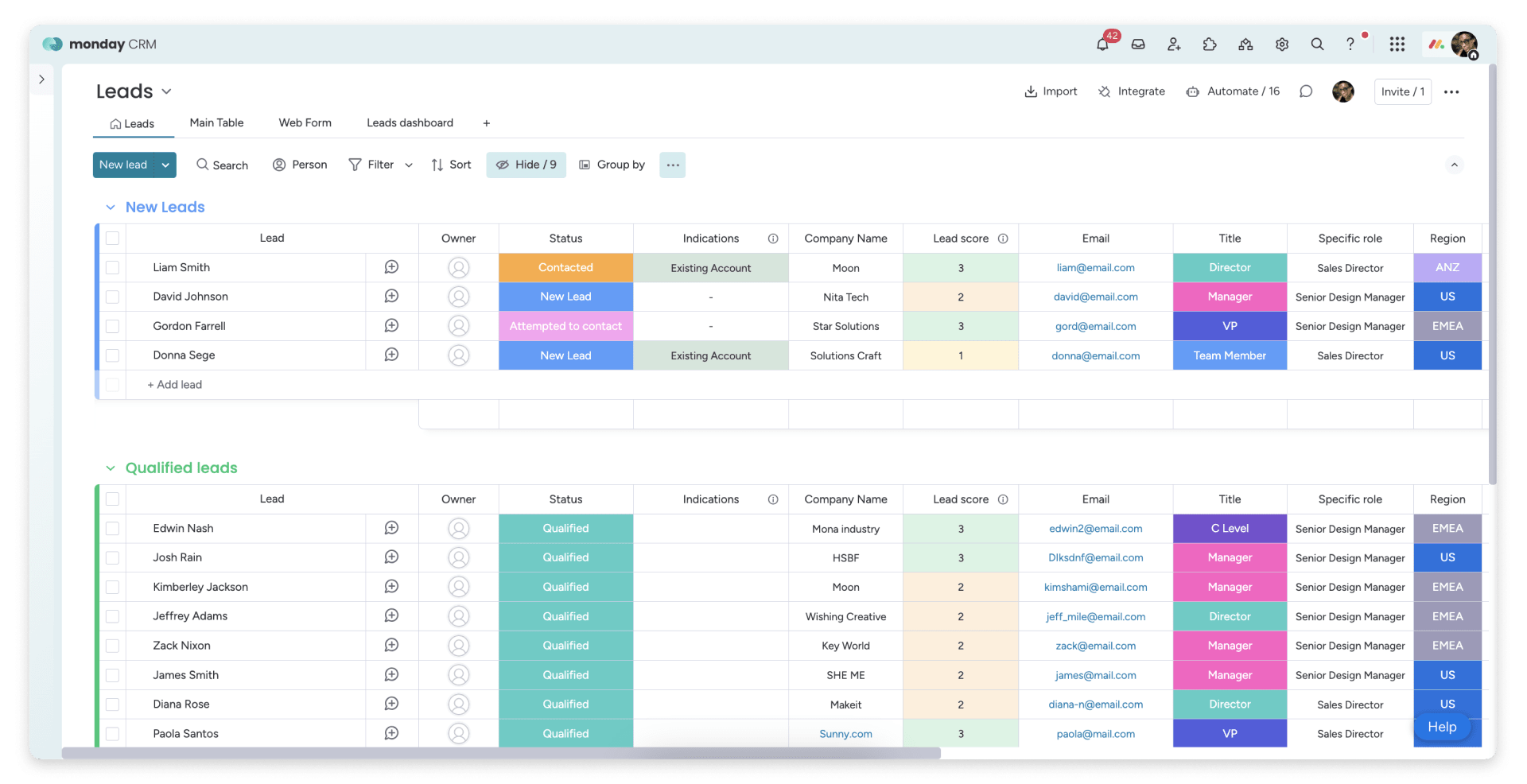
What is AI lead generation and management
AI lead generation is using artificial intelligence to find and qualify potential customers automatically, a shift reflected by the 90 percent of commercial leaders who expect to use generative AI solutions often in the coming years. This means instead of manually searching for prospects, AI does the heavy lifting — scanning databases, analyzing behaviors, and identifying who’s most likely to buy from you.
AI lead management takes those prospects and guides them through your sales process using smart automation. Think of it as having a tireless assistant who organizes your leads, sends follow-ups at the perfect time, and tells you exactly who to call next.
Here’s what AI actually does in your sales process:
- Finds prospects: Scans millions of data points to identify potential customers
- Qualifies leads: Analyzes behaviors and characteristics to score lead quality
- Personalizes outreach: Creates unique messages for each prospect
- Tracks interactions: Records every touchpoint and response
- Predicts outcomes: Tells you which deals will likely close and when
The technology works by connecting to your existing systems and learning from your sales history. It identifies patterns in your successful deals and uses those insights to find similar prospects. monday CRM makes this accessible by integrating AI directly into your workflow — no coding or technical setup required.
Why AI outperforms traditional lead gen methods
Traditional lead generation means hours of manual research, cold calling from static lists, and sending the same generic email to hundreds of prospects. Your sales team spends most of their time on activities that don’t directly generate revenue, but AI adoption can flip this model, with organizations reporting up to a 50% increase in leads and appointments.
While a human can research maybe 20 prospects per day, AI analyzes thousands in minutes. It spots buying signals humans miss, like when a company gets funding, hires new executives, or changes their tech stack.
The personalization difference is striking. Traditional methods use templates with basic mail merge. AI creates genuinely unique messages based on each prospect’s specific situation, industry challenges, and recent activities. This isn’t just inserting their name, it’s crafting relevant content that speaks to their actual needs.
Speed transforms everything about your sales process. AI identifies interested prospects the moment they show buying signals. It responds to inquiries instantly, schedules follow-ups automatically, and alerts your team when prospects are ready to talk. No more missed opportunities because someone was in a meeting.
7 benefits of AI for lead management
AI transforms lead management from a time-consuming chore into a strategic advantage. For leaders, this means a more predictable pipeline and a clear return on investment, while sales teams gain the focus needed to close more deals.
These 7 benefits compound as the system learns more about your ideal customers and sales patterns:
1. Accelerated lead qualification
AI evaluates prospects against dozens of criteria simultaneously. It checks company size, industry, technology usage, hiring patterns, and online behavior in seconds. Your team knows exactly which leads deserve immediate attention and which need more nurturing.
2. Continuous nurturing
Prospects receive perfectly timed touchpoints across email, social media, and other channels. AI maintains conversations when your team is busy, ensuring no lead goes cold. The system adapts messaging based on engagement, keeping prospects interested until they’re ready to buy.
3. Higher conversion accuracy
Predictive analytics identify your hottest prospects with remarkable precision. AI recognizes subtle patterns that indicate buying readiness — patterns your best salespeople might sense intuitively but can’t always articulate. This focus on high-probability leads dramatically improves close rates.
4. Unified view of prospects
Every interaction, research finding, and behavioral signal gets captured in one place. Sales reps see the complete story before every call. monday CRM displays this information in an intuitive interface that makes preparation quick and thorough.
5. Real-time data enrichment
Prospect information updates automatically as situations change. New funding rounds, leadership changes, and company expansions appear in your CRM without manual research. Your team always has current, relevant talking points.
6. Predictive forecasting
AI analyzes your pipeline to predict which deals will close and when. Revenue leaders gain visibility into future performance, allowing proactive adjustments. This forecasting improves over time as AI learns your specific sales cycles.
7. Reduced manual tasks
Automation eliminates hours of repetitive work. Data entry, follow-up scheduling, and initial research happen automatically. Your team focuses on building relationships and closing deals instead of administrative tasks.
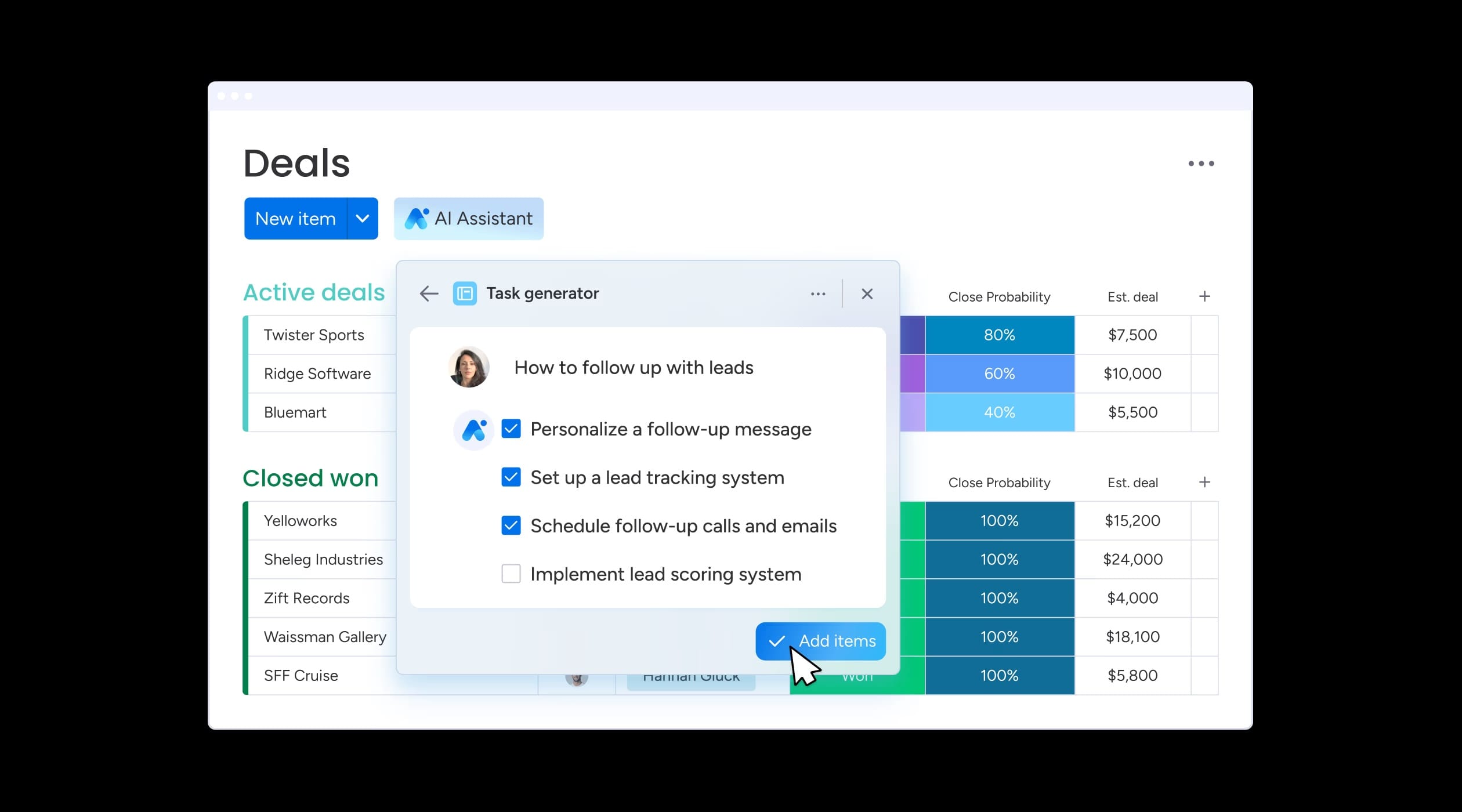
7 strategies to implement AI lead gen and nurturing
Success with AI requires thoughtful implementation. Start small, prove value, then expand. The following strategies will help you build a system that generates consistent results:
1. Automate lead scoring
Set up AI lead scoring that reflects your unique sales process. Define what makes a lead valuable for your business — company size, industry, specific technologies they use, or behavioral signals. The AI learns from your wins and losses, continuously refining its scoring accuracy.
Start with basic demographic scoring, then add behavioral factors as you gather more data. monday CRM’s AI Blocks let you build custom scoring models without technical expertise.
2. Use chatbots for instant engagement
Deploy AI chatbots on high-traffic pages to capture and qualify leads 24/7. Program them with your most common qualifying questions. Good chatbots feel conversational while efficiently gathering the information your sales team needs.
Focus chatbots on specific goals — booking demos, answering pricing questions, or routing to the right department. Keep initial implementations simple and expand capabilities based on what visitors actually ask.
3. Personalize outreach with AI platforms
Move beyond basic mail merge to true personalization. AI analyzes each prospect’s digital footprint — their company challenges, recent initiatives, and content consumption. It then crafts messages addressing their specific situation.
This means mentioning their actual business challenges, referencing their recent company news, and proposing solutions that fit their context. The difference in response rates is dramatic.
4. Integrate predictive analytics
Use AI to identify not just who might buy, but when they’re ready to engage. Predictive models analyze thousands of signals to recognize buying readiness. Your team can time their outreach perfectly, reaching prospects at the moment of highest interest.
Set up alerts for significant changes — when a prospect’s engagement suddenly increases or when multiple stakeholders from the same company start researching your solution.
5. Employ AI lead generation platforms
Choose platforms that integrate seamlessly with your existing tech stack. Look for solutions that find new prospects matching your ideal customer profile and automatically add them to your nurture campaigns. monday CRM’s integrations make this process smooth, pulling prospects from multiple sources into unified workflows.
6. Combine human expertise and AI
Create clear handoff points between AI and human interaction. Let AI handle initial qualification, research, and nurturing. When prospects show serious interest, your team takes over for consultative selling. This combination maximizes both efficiency and relationship building.
Train your team to work with AI insights. Show them how to interpret AI recommendations and use automated research to have more meaningful conversations.
7. Track real-time dashboards
Build dashboards that show what’s actually working. Track lead quality, conversion rates by source, and time to conversion. Real-time visibility lets you adjust strategies quickly instead of waiting for monthly reports.
Use these insights to refine your AI parameters. If certain lead sources consistently underperform, adjust scoring. If specific messages drive engagement, expand their use.
Try monday CRM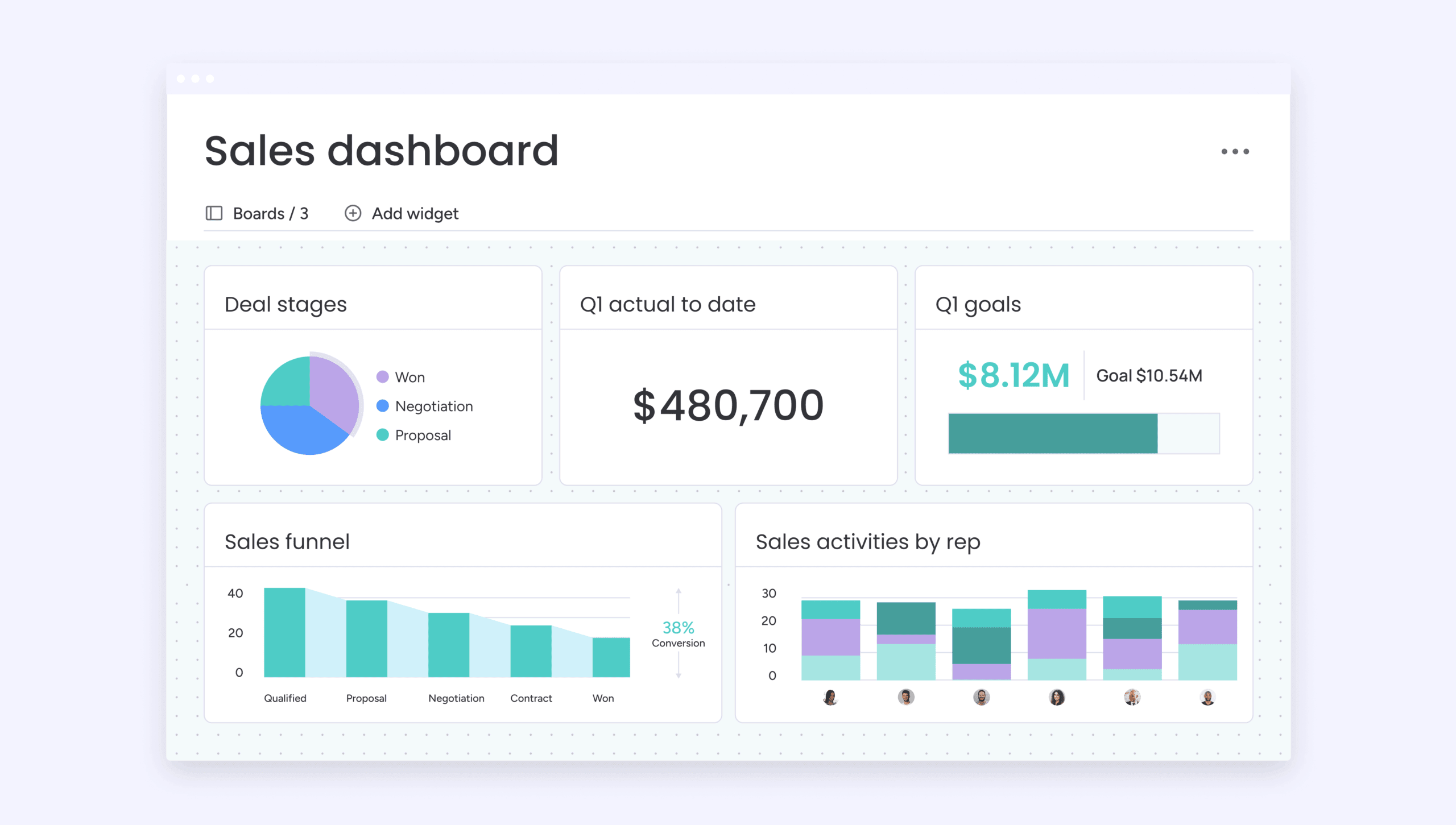
How to get started with AI for lead management
Starting with AI doesn’t require a complete overhaul of your sales process. Focus on foundation first, then build incrementally.
Assess your current CRM and data quality
Clean data powers effective AI. Start by auditing what you have. Look for duplicate records, incomplete information, and inconsistent formatting. AI can work with imperfect data, but results improve dramatically with clean inputs.
Don’t try to fix everything at once. Prioritize the data fields that matter most for lead qualification. Establish processes to maintain data quality going forward — this investment pays off quickly.
Identify quick win automations
Find one or two processes that waste significant time and have clear rules. Common starting points include:
- Lead assignment: Route leads to the right rep based on territory, industry, or deal size
- Follow-up reminders: Automatically schedule next steps based on prospect actions
- Basic lead scoring: Score leads based on demographic fit with your ideal customer profile
These simple automations build confidence and demonstrate value immediately. monday CRM makes these automations accessible through visual workflows anyone can build.
Plan a gradual rollout
Map out a phased approach over 3-6 months. Start with one team or process, measure results, then expand. This approach ensures proper adoption and lets you refine based on real experience.
Phase 1 might focus on lead scoring and assignment. Phase 2 adds automated nurturing. Phase 3 introduces predictive analytics. Each phase builds on previous success.
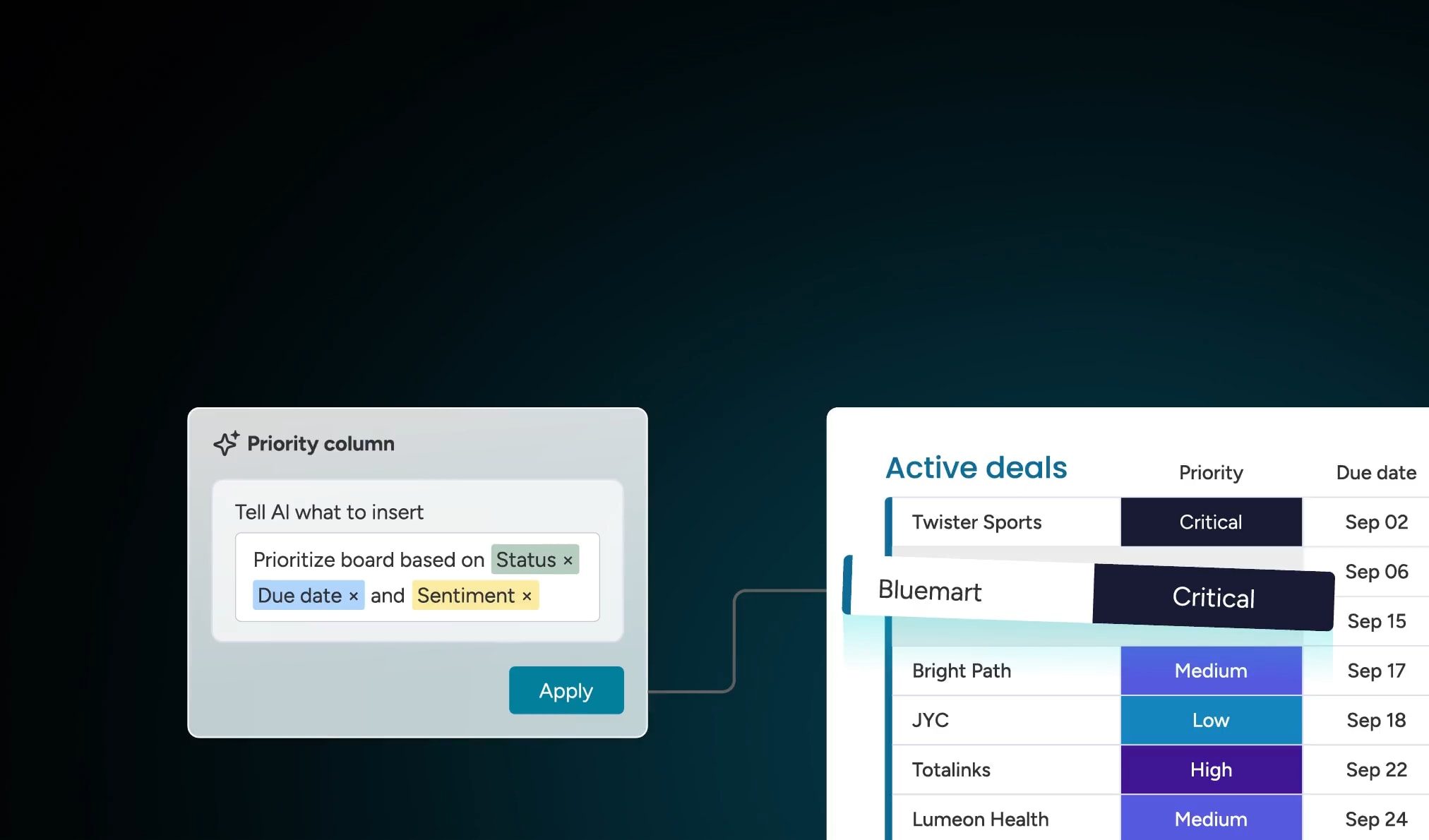
Common challenges and ways to overcome them
Every AI implementation faces predictable obstacles. Knowing what to expect helps you prepare solutions in advance.
1. Data quality challenges
- Common issues: Inconsistent formats, missing information, and duplicate records limit AI effectiveness
- Practical approach: Start with the data you have rather than delaying launch
- Ongoing solution: Improve incrementally and establish data governance practices to prevent future problems
2. Team adoption hesitation
- Key concern: Sales reps worry AI will replace them, with 30% of employees fearing job replacement
- Effective strategy: Demonstrate how AI handles routine tasks so they can focus on relationship building
- Motivation tactic: Publicly celebrate early wins to build team enthusiasm
3. Integration complexity
- Reality check: Modern platforms like monday CRM dramatically simplify integration
- Available tools: Pre-built connectors and visual integration builders require minimal technical expertise
- Starting point: Begin with one-way data syncs before attempting complex bi-directional integrations
4. Privacy considerations
- Industry context: Many organizations cite security concerns as the biggest barrier to adoption
- Solution approach: Choose platforms with strong security credentials and clear data handling policies
- Customer experience: Be transparent about data usage. Most customers appreciate the improved, personalized experience AI enables
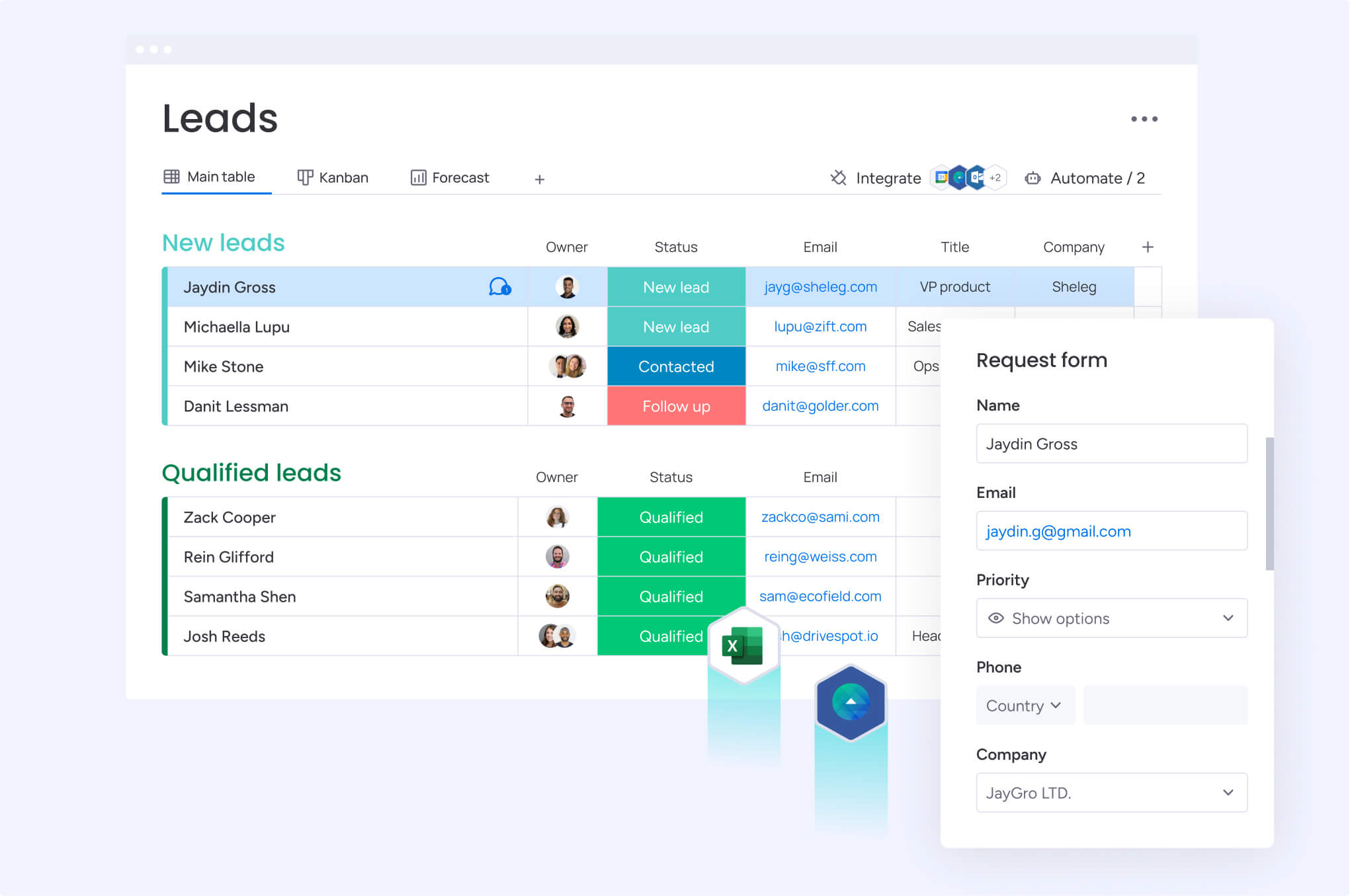
Key metrics to track ROI from AI leads
Measuring AI impact requires tracking both efficiency gains and revenue results. Focus on metrics that demonstrate clear business value.
Lead conversion rate
Compare conversion rates between AI-generated leads and traditional sources. Track this metric by campaign, time period, and lead score to understand what’s working. Most teams see significant improvements within the first quarter.
Break down conversion rates by stage — initial response, qualification, and close. This shows where AI has the most impact and where human skills still matter most.
Time spent per lead
Measure how much time your team saves on routine tasks. Track hours spent on research, data entry, and initial outreach before and after AI implementation. Most teams recover 10-15 hours per rep per week.
Convert time savings to dollar value. Show leadership how AI lets expensive sales resources focus on high-value activities instead of administrative work.
Predictive forecast accuracy
Monitor how well AI predictions match actual results. Track forecast accuracy at 30, 60, and 90 days out. As AI learns your patterns, accuracy improves significantly.
Use this data to make more confident business decisions. Accurate forecasts help with hiring, inventory, and resource allocation across your organization.
Accelerate your pipeline with monday CRM's intelligent lead management
AI lead management represents a fundamental shift from reactive to proactive revenue generation. Organizations that embrace AI now will have significant competitive advantages as the technology continues to evolve.
monday CRM delivers everything you need to transform your lead management process:
- No-code AI integration: Powerful AI capabilities without requiring technical expertise
- Intuitive interface: A platform teams actually want to use, increasing adoption
- Automated workflows: Streamline repetitive tasks and focus on high-value activities
- Real-time analytics: Make data-driven decisions with customizable dashboards
- Seamless collaboration: Keep your entire revenue team aligned on a single platform
Ready to transform your lead management process? Try monday CRM and discover how AI can 10X your leads.
Try monday CRMFAQs
How does AI lead generation work with existing CRM systems?
AI lead generation works with existing CRM systems through APIs and native integrations that sync data automatically between platforms. Most AI platforms connect to popular CRMs like Salesforce, HubSpot, or monday CRM without requiring data migration or complex technical setup.
What types of businesses benefit most from AI lead management?
B2B companies with complex sales cycles benefit most from AI lead management, especially those with multiple decision makers and longer sales processes. SaaS companies, professional services firms, and manufacturing businesses with high-value deals see particularly strong results from AI implementation.
How accurate is AI at predicting which leads will convert?
AI prediction accuracy for lead conversion typically starts around 60% and improves to 75-85% after processing 6-12 months of your sales data. Accuracy depends on data quality, sales cycle complexity, and how consistently your team follows established processes.
Can AI lead management replace human sales representatives?
AI lead management enhances rather than replaces human sales representatives by handling data analysis, routine tasks, and initial qualification while humans focus on relationship building, complex problem solving, and closing deals. The most successful teams use AI as a force multiplier, not a replacement.
How long does it take to see results from AI lead generation?
Most organizations see initial results from AI lead generation within 30-45 days, including improved lead quality and time savings on routine tasks. More significant improvements in conversion rates and pipeline velocity typically appear after 90-120 days as the AI learns your specific patterns.
What data does AI need to generate quality leads effectively?
AI needs historical sales data including won and lost deals, customer demographics, engagement history, and behavioral data to generate quality leads effectively. The system also benefits from website analytics, email interaction data, and any third-party data sources you can provide about your target market.

